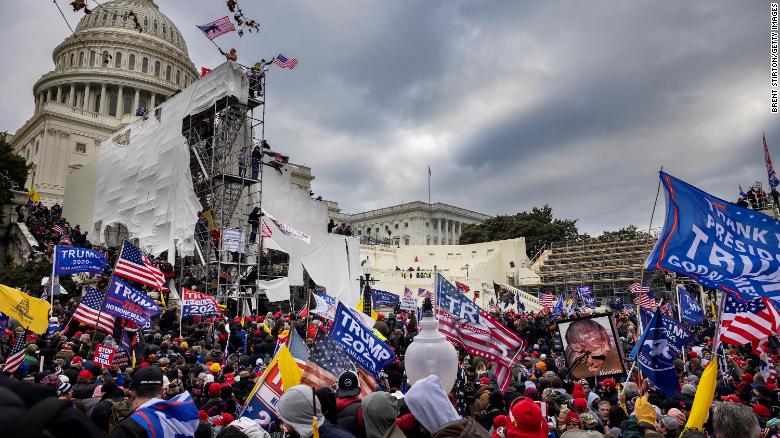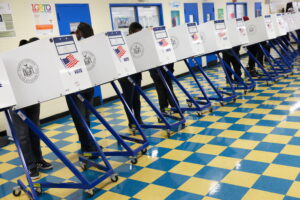CNN Poll: Most Americans think election results could lead to political violence in the coming years
4 min read
WASHINGTON, DC - JANUARY 6: Trump supporters clash with police and security forces as people try to storm the US Capitol on January 6, 2021 in Washington, DC. Demonstrators breeched security and entered the Capitol as Congress debated the 2020 presidential election Electoral Vote Certification. (photo by Brent Stirton/Getty Images)
A broad majority of Americans say that political violence in response to election results is likely in the United States in the next few years, according to a new CNN Poll conducted by SSRS.Overall, 71% say political violence in response to election results is at least somewhat likely, including 34% who believe it is very likely. The expectation that elections will lead to violence also cuts across party lines (78% of Democrats, 70% of independents and 65% of Republicans describe it as likely).There is far less partisan agreement over whether American democracy took a blow due to the January 6 attack on the US Capitol. Overall, 62% are concerned that the attack weakened American democracy.
But a political divide was evident: Among Democrats (79%) and independents (64%), most say they are concerned that it weakened democracy, but just 36% of Republicans feel the same.Republican leaders, including Republicans in Congress and former President Donald Trump, receive sharply negative ratings for their handling of the response to the January 6 attack. Overall, 70% disapprove of congressional Republicans’ handling of the response, and 67% disapprove of the way Trump handled it. Democrats, including President Joe Biden and the Democrats in Congress, fare a bit better, with 52% approving and 40% disapproving of Biden’s handling of the aftermath of the attack, while 45% approve and 49% disapprove of the way Democrats in Congress responded.
Views are mixed over the FBI’s response to the attack, 43% approve and 46% disapprove. The FBI plays a leading role in investigating and prosecuting those involved in the attack.The divergent views over Democratic and Republican leaders are largely due to the differences in how Democrats and Republicans view their own partisans in the matter. While independents are tepid, at best, on each of the people or groups tested (Biden’s 47% approve to 45% disapprove split is the most positive among independents), Democrats largely approve of how Biden (90%) and Democrats in Congress (82%) handled the aftermath of the attack. Republicans are less unified behind Trump (63% approve) or their partisans in Congress (44% approve).
And as Republicans in several states move to make voting rules more restrictive partly in response to false claims of widespread fraud in the 2020 election, the poll finds 53% of adults say the bigger problem for elections in the US is that the rules aren’t strict enough to prevent illegal votes while 39% say the bigger problem is that the rules make it too difficult for eligible citizens to cast ballots.There are broad divides on this question by party, by race and ethnicity.
Nearly all Republicans (92%) say that voting rules not being strict enough is a bigger problem, and a majority of independents agree (56%). Among Democrats, 70% say the bigger problem is that the rules make it too hard for eligible citizens to cast ballots.Most people of color say that access is the bigger problem (50% to 40%), while Whites break the opposite way (59% say it’s a bigger problem that the rules aren’t strict enough). But among both of those groups, there are divisions. Most Black Americans say that access is the bigger problem, while a narrow majority of Hispanic Americans break toward concerns that the rules are not tight enough. And while 92% of White Republicans say that the rules are not strict enough, 81% of White Democrats say the rules make it too hard for eligible citizens to vote.As the Republican Party begins to adjust to a post-Trump, Democratic-controlled Washington, most Republicans and Republican-leaning independents say the Party is united (63%).
Self-identified Republicans are more likely to see the Party as united than are independents who lean toward the Party (69% vs. 52%), and those who describe their ideology as “very conservative” are more apt to feel that way than are those who are less conservative, moderate or liberal (71% among the very conservative, 59% among those who are somewhat conservative and 58% among moderates or liberals).Republicans largely see Trump as having had a good effect on the Party (67%) more than a bad effect (16%), but they are not on board with penalizing elected officials who have expressed opposition to Trump.
Overall, 76% of Republicans and Republican-leaning independents say the party should not penalize those officials, just 20% say the Republican Party should do that. There aren’t many significant divisions among Republicans on that question, but one stands out. Among white college graduates — a group that is believed to have shifted more Democratic during the Trump years — a whopping 94% say that the Party should not penalize elected officials who have opposed Trump, while among whites who do not hold college degrees — a staunch base of support for the former president — that drops to 74%.The CNN Poll was conducted by SSRS March 3 through 8 among a random national sample of 1,009 adults reached on landlines or cellphones by a live interviewer.
Results for the full sample have a margin of sampling error of plus or minus 3.6 percentage points.The methodology and weighting for the poll incorporates some changes to CNN’s polling practices made starting with the January 2021 survey. Interviews conducted on cell phones made up 75% of the total, up from 65% in recent CNN surveys. Dialing extended over six days rather than four days, allowing for more effort to be made to contact those who are not easily reachable. Demographic weighting was adjusted to account for more discrete education categories broken out by race, and a geographic weight was applied to ensure representative distribution by population density.



